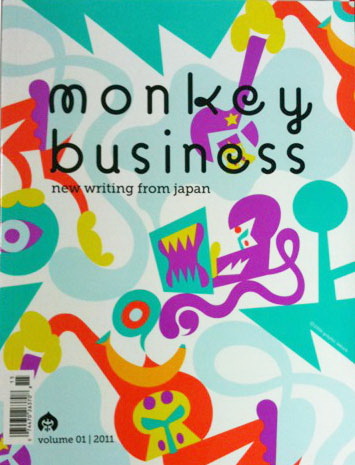Monkey Business : New Writing from Japan Volume 01 / 2011 (A Public Space Literary Projects, Inc.)
Although our blog is titled “Asia by the Book”, I have decided to go against the grain and review a magazine. But this isn’t just any magazine. This is the first English language version of a popular Japanese literary magazine called Monkey Business, created in 2008 and named after a line in a Chuck Berry tune. The Monkey Business Manifesto states that “Monkey Businessis a newly founded journal of new writing from Japan and abroad with a few not-so-new works strategically slipped in.” It’s my belief that literary magazines deserve as much attention as novels as they are usually full of short stories, novellas, poems, and reviews of upcoming titles.
Published by A Public Space, also a literary journal, Monkey Business is edited by Ted Goossen, translator of Japanese publications into English, and Motoyuki Shibata, known for his Japanese translations of contemporary authors such as Thomas Pynchon, Steve Millhauser and Paul Auster to name a few. This issue is a compilation of pieces from the magazine’s first year in publication which are now translated into English, including short stories, essays, poems, manga, interviews and more. Goosen and Shibata do not limit their pieces to Japanese writers, they also feature a few foreign writers as well.
A highlight of this first issue is an interview with popular author and 2010 nominee for the Nobel prize in literature, Haruki Murakami conducted by novelist Hideo Furukawa in 2008, a winner of the Japan Mystery Writers Association Prize and SF Grand Prize for his novel Arabia. The interview starts off with the two authors discussing writing and where they get their ideas. It follows with Furukawa asking Murukami why he decided to live abroad, about his time spent in the U.S. and writing The Wind-Up Bird Chronicle, his return to Japan and writing his first non-fiction book about the Aum Doomsday Cult and sarin gas subway attack. They also talk about first- versus third- person narrations. Any fan of Murakami’s works won’t want to miss out on this interview.
One of my favorite stories from this compilation is Sandy’s Lament – from The Memoirs of theSramana Wujing by Atsukshi Nakajima. This was part of a series of stories based on the Chinese novel Journey to the West by Wu Cheng’en which in turn is loosely based on a true story about a monk named Tripataka and his journey to bring back Buddhist scripture from India. For you trivia buffs and otaku, you may be surprised to know a popular manga series was also based on Journey to the West – Akira Toriyama’s Dragonball! In the original story, Tripitaka has three companions – Sun Wukong (alias Monkey), Zhu Bajie (alias Pig), and Xia Wujing (alias Sandy). In the Japanese translation, Sandy would be a kappa, a water spirit. This short story is narrated by Sandy as he wonders why he and his two companions continue to follow Tripitaka.
The manga in this issue is A Country Doctor by the Brother and Sister Nishioka and based on a story by Franz Kafka. In keeping with original Japanese style, the manga is read from left to right which means you have to skip ahead a few pages and read the story in descending pages. There are also poems by Mina Ishikawa, The Sleep Division; Minoru Ozawa, Monkey Haiku; Shion Mizuhara, Monkey Tanka; Masayo Koike, When Monkeys Sing all translated by Ted Goossen, and short stories by Yoko Ogawa, Koji Uno, and Sachiko Kishimoto.
If your only exposure to contemporary Japanese authors has been to Yukio Mishima, Natsume Soseki, Yasunari Kawabata, Shusaku Endo, or Junichiro Tanizaki, then this literary journal will open your eyes to a whole new world. Be the first of your Japanophile friends to know who the next up- and- coming literary geniuses are and enjoy some new fiction! The English language version is currently planned as an annual but as more people become familiar with it, perhaps Shibata and Goossen will turn it into a quarterly. Let’s keep our fingers crossed. by Ernie Hoyt
